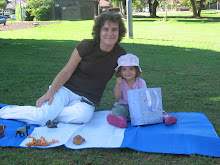I finished the draft of my collection development policy about a week ago. This was an assignment I have been dreading. One of the posts on the forum suggested looking at "Collection Management for Youth" in regards to goals for the collection, and this switched a light bulb on for me. I could see how my growing passion for IL could be mirrored in the library management side of the job.
Collection Management for Youth is all about developing a user centred collection which goes hand in hand with information literacy - simple when you see it, but hay I'm only a beginner!
Still working on ETL 401 assignment. Trying to be critical of the different information skills models. I wish I had some experience as a TL as I know this would place me in a much better position to see what works and what doesn't first hand. I got a video explaining the Big 6, which was very helpful.
Revisiting the "standards of excellence" is interesting. When I looked at them for my assignment on Information Literate Communities, I found them overwhelming, but I was looking at them as a role description, seeing them as something to aim for is more inspiring and achievable. What keeps standing out for me is the leadership role that people like Henri (2005)and Oberg and the standards document expect of TL's. I find this exciting but I also wonder about the general status of TL's. Working as a Head of Department I did not accomplish half the work expected of a TL. I started to wonder if Heads of Information Services must be payed more than a normal HOD. I was shocked when talking to Helen HIS at Santa Sabina, to hear that if you are running a library in a DET school, you are only payed as a normal teacher. The time management skills in 7 Habits of Highly Effective People are definately going to come in handy!
Saturday, May 23, 2009
Wednesday, May 20, 2009
IL
Very excited about Carol Kulthau's work. I think the way she incorporates feelings into the model is spot on. It is our feelings that get in the way of learning, and our feelings that spur us on to new learning discoveries. I will definitely use her work as a TL (when I hopefully get a job).
The fact that her Information Search Process is based on empirical study and psychological theory (Kulthau 2004) gives her model a depth that the other processes don't have. When I read it I thought 'wow this is how I learn.' It reminded me of Maria Montessori's work. She also came up with her theory by observing learners - in her case young children.
Why didn't my old principal champion Information Literacy models like this?
The fact that her Information Search Process is based on empirical study and psychological theory (Kulthau 2004) gives her model a depth that the other processes don't have. When I read it I thought 'wow this is how I learn.' It reminded me of Maria Montessori's work. She also came up with her theory by observing learners - in her case young children.
Why didn't my old principal champion Information Literacy models like this?
Subscribe to:
Comments (Atom)
